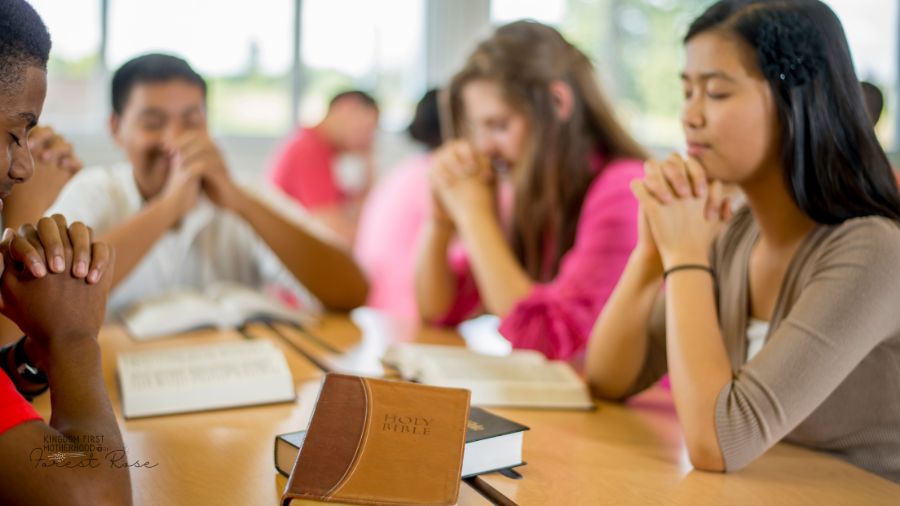Christianity has played a significant role in shaping history, ethics, and the moral foundation of countless societies. Yet, in today’s educational landscape, the discussion of Christianity in education is often met with controversy. The question remains: Should Christianity be taught in schools? And if so, how can it be done in a way that fosters understanding, moral growth, and intellectual curiosity without infringing on personal beliefs?

The Historical Connection Between Faith and Education
For centuries, education and faith went hand in hand. Many of the earliest schools were started by Christian institutions, with the Bible as the main textbook. In medieval Europe, monasteries safeguarded knowledge, trained scholars, and viewed learning as a way to better understand God’s creation. Even in early America, education was built on biblical principles—kids didn’t just learn to read; they learned scripture alongside their lessons. But as society has become more secular, Christian teachings have been largely stripped from public school curriculums. While the separation of church and state prevents any religion from being imposed, it has also created a noticeable gap in both moral and historical education.
The Value of Christian Teachings in Schools
The debate over Christianity in schools is often framed as a legal or political issue, but at its core, it is a question of values. Christianity is not just a religion; it is a historical force that has influenced law, philosophy, art, literature, and human rights. To remove it entirely from the classroom is to deprive students of a full understanding of history and ethics. Christian teachings provide a moral compass that transcends theology, offering lessons on kindness, integrity, forgiveness, and the importance of service.
At the same time, modern education increasingly prioritizes Social-Emotional Learning (SEL), which claims to teach children emotional regulation, empathy, and decision-making. Yet, unlike Christianity, which has stood the test of time in shaping strong moral foundations, SEL often shifts according to cultural trends and secular ideologies. Instead of anchoring students in absolute truth, many SEL programs focus on subjective emotions, sometimes at the expense of traditional values. In a world where bullying, dishonesty, and moral confusion are increasingly common, the timeless values of Christianity could offer much-needed guidance—truths that don’t change with shifting societal norms.
Christianity in Education: Balancing Perspectives
One of the most effective ways to incorporate Christianity in education is through historical and literary perspectives. Studying the Bible as literature allows students to engage with some of the most influential texts ever written. Stories such as the Good Samaritan, David and Goliath, and the Parables of Jesus provide powerful moral lessons that apply to believers and non-believers alike. In history classes, discussing Christianity’s role in shaping civilizations, from the Roman Empire to the civil rights movement, provides context for understanding global events. A well-rounded education should include Christianity, not as doctrine but as an essential piece of cultural and intellectual history.
Faith-based schools offer another model for integrating Christianity into education. Schools with a Christian foundation provide students with not only academic excellence but also spiritual growth. These schools teach subjects like math, science, and literature through the lens of faith, helping students see God’s presence in all aspects of learning. They also emphasize character development, teaching children to approach life with humility, compassion, and purpose. Parents who value a Christ-centered education often seek out Christian schools or homeschooling programs that incorporate biblical teachings into the curriculum.
However, even in secular environments, Christian values can be woven into daily learning without proselytizing. Schools can encourage virtues like honesty, patience, and selflessness—values that align with Christian teachings but are universally beneficial. Educators can inspire students to think deeply about morality, justice, and personal responsibility, fostering discussions that allow them to explore faith in a respectful and open-minded way.
Outside the classroom, Christian businesses and organizations help reinforce faith-based education. Companies like Faith & Glory, which specialize in Christian and faith-based products, provide resources that help parents and teachers incorporate biblical principles into learning. Whether through scripture-based journals, artwork that highlights biblical stories, or educational materials that tie faith to daily life, these tools serve as gentle yet powerful reinforcements of Christian values.
The Role of Technology in Faith-Based Learning
As technology continues to shape education, Christian teachings are also finding a place in digital learning. Online Bible studies, faith-based educational apps, and Christian homeschooling resources make it easier than ever for students to engage with scripture. Podcasts, virtual Sunday schools, and YouTube channels dedicated to biblical literacy provide modern ways for young people to explore faith on their own terms. This shift proves that Christianity in education does not have to rely solely on traditional classrooms; it can thrive in digital spaces where students are already engaged.
Why Christianity Still Matters in Education
Critics of Christianity in schools often argue that religious teachings should be kept private, that faith is a personal matter that does not belong in public education. However, this view overlooks the fact that every education system is based on a set of values. If schools can teach about other belief systems, philosophies, and secular ethics, then excluding Christianity is not neutrality—it is omission. Providing students with the opportunity to learn about Christianity in education equips them with a broader worldview, allowing them to engage with different perspectives in a thoughtful and informed way.
Many students come from Christian homes and find themselves struggling to reconcile their faith with what they hear in secular classrooms. When big questions about morality, purpose, and existence come up, they’re often left searching for answers beyond what a textbook can offer. A well-balanced education wouldn’t push faith aside but would give students the freedom to wrestle with these questions, recognizing that Christianity isn’t just a private belief—it’s a powerful force that has shaped both history and personal identity. More importantly, it’s not just about knowing facts; it’s about knowing Jesus, the One who gives real meaning to the questions every heart is asking.
Ultimately, the goal of education should be to cultivate wisdom, character, and understanding. Whether in private Christian schools, homeschooling environments, or public school discussions, Christianity has much to offer in shaping young minds. Teaching students about faith—not in a way that forces belief but in a way that fosters knowledge—ensures that they grow up not just informed but inspired.
A world that shuts Christianity out of education risks raising generations adrift from the very values that have shaped societies for centuries. Schools should be more than just places for academics—they should encourage deep thinking, character growth, and the pursuit of truth. Whether through history, literature, ethics, or personal reflection, God deserves a place in education, not as a requirement, but as an invitation to explore the faith that has transformed lives for generations. Because at the end of the day, knowing about God isn’t enough—students need the chance to know Him personally, to understand that faith isn’t just history, it’s a relationship that changes everything.
Christianity has shaped history, influenced ethics, and built the moral framework of many societies. Yet, when it comes to Christianity in education, the topic often sparks debate. Should it be encouraged in schools? And if so, how can it be included in a way that nurtures understanding, strengthens moral character, and sparks curiosity—without overstepping personal beliefs?
For more homeschooling inspiration, tips and encouragement, make sure to follow KFH on Facebook, Pinterest, Instagram and Twitter, and subscribe to our Newsletter for some FREE GOODIES!
Forest Rose is a God Loving, Blessed Wife, & Mama to 3 girls. She’s passionate about lifting moms out of the trenches that are discouraged, overwhelmed, or feeling alone or isolated. Her hope is to point them to Christ and equip them to rise up with a newfound hope and joy within, that He alone can provide. Besides blogging, she also loves to create printables!



Leave a Reply